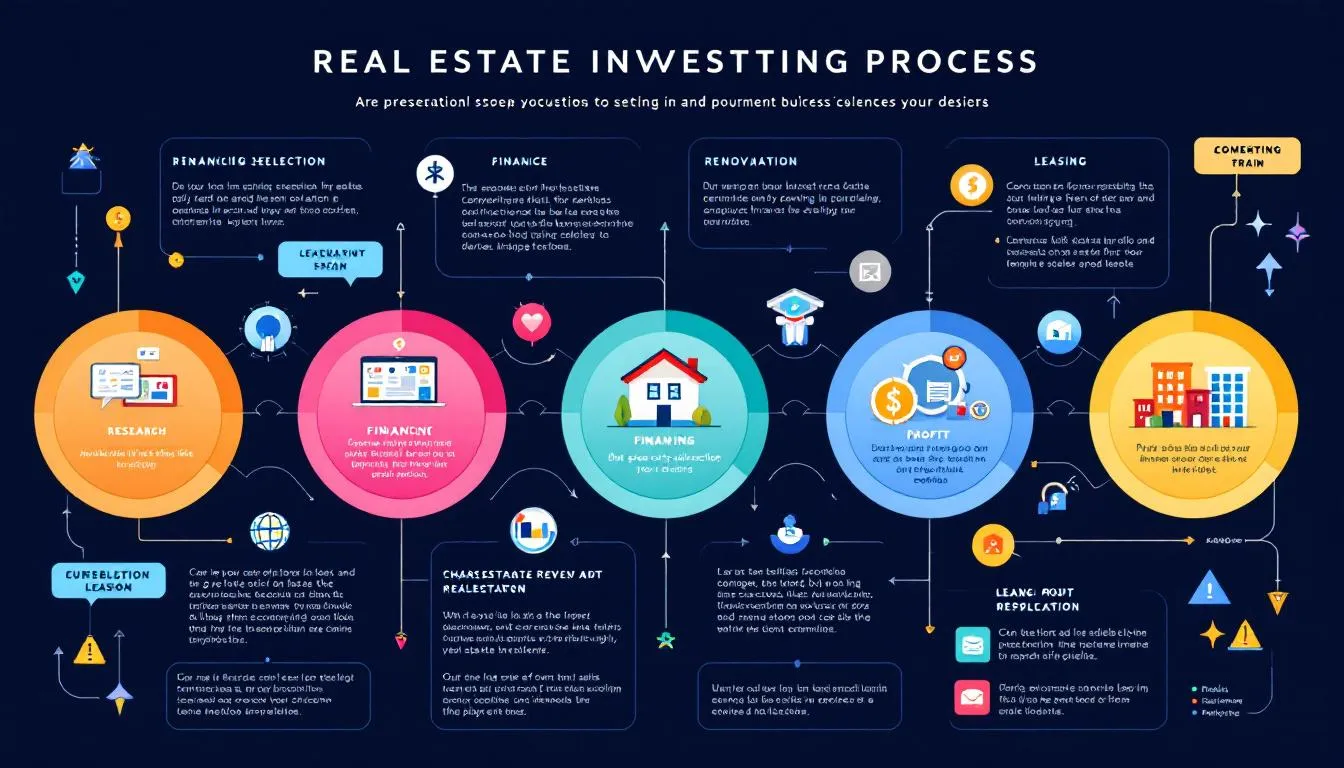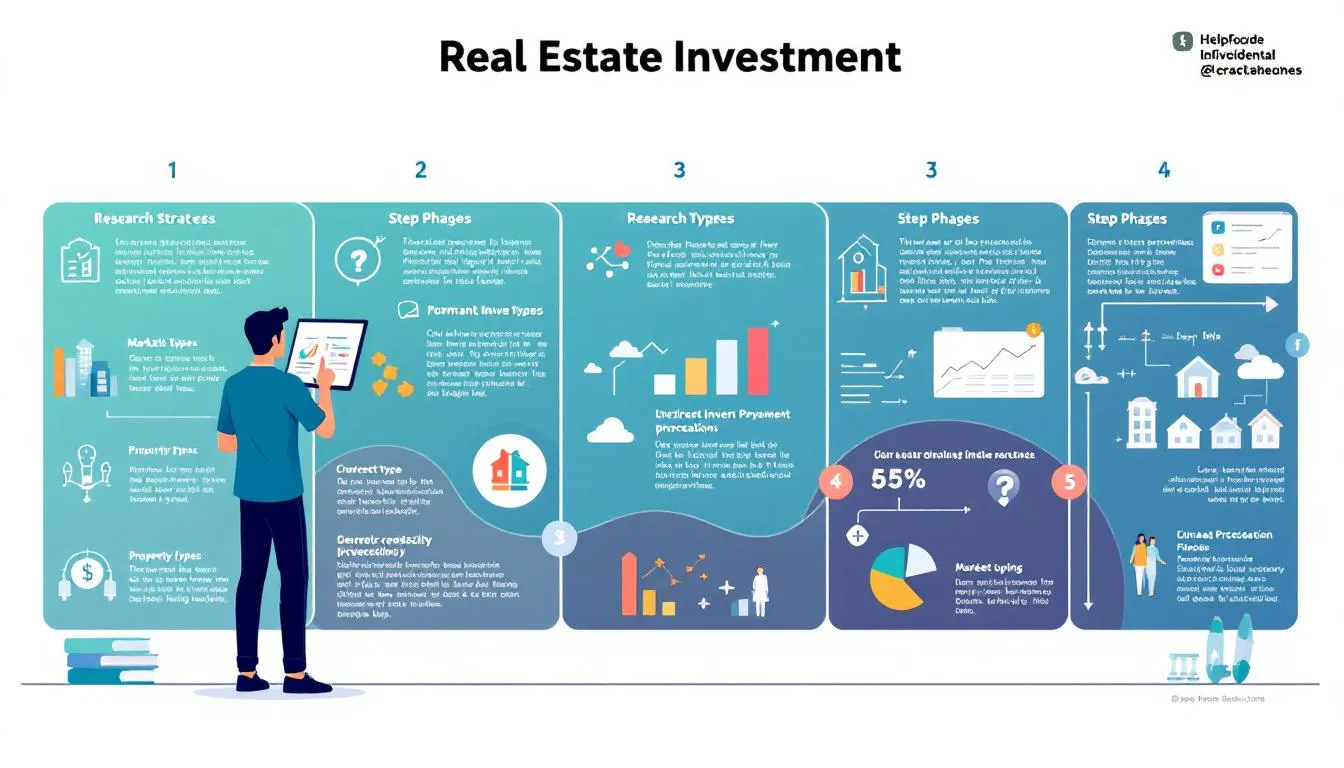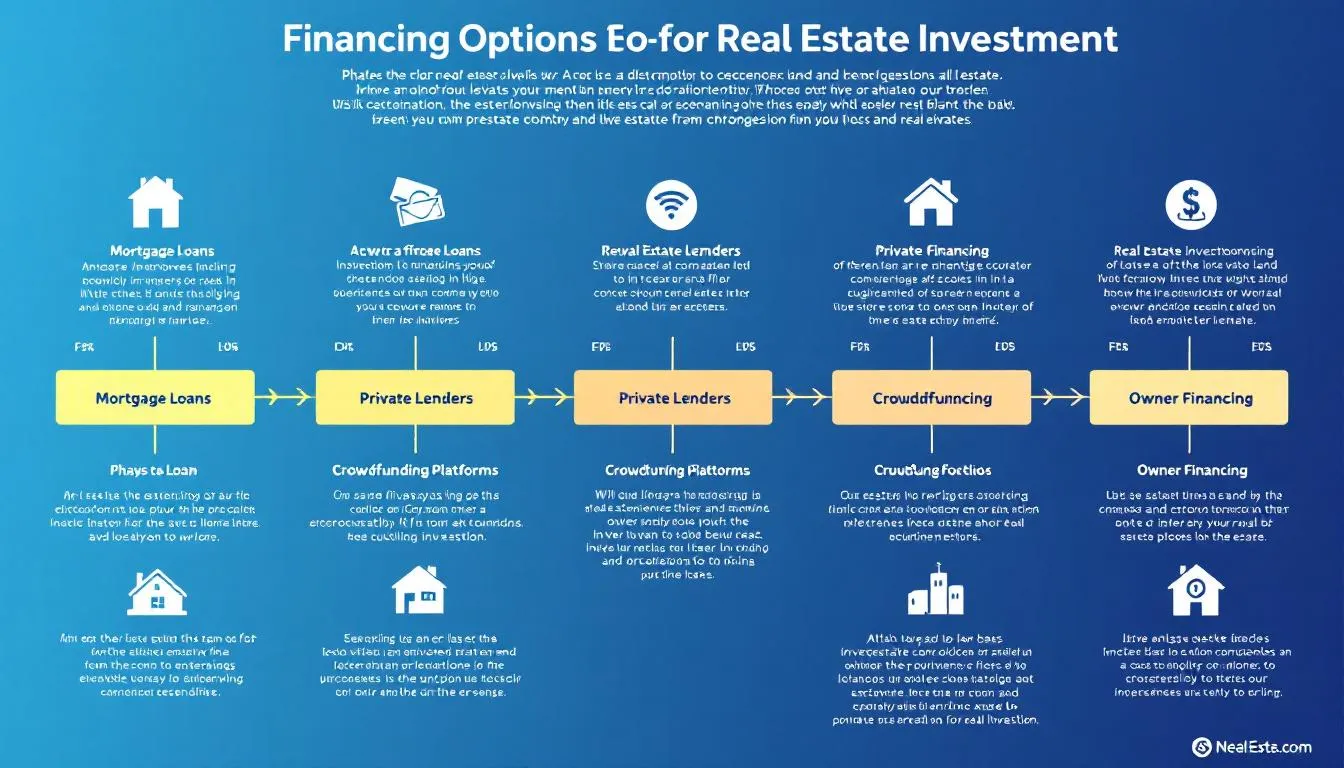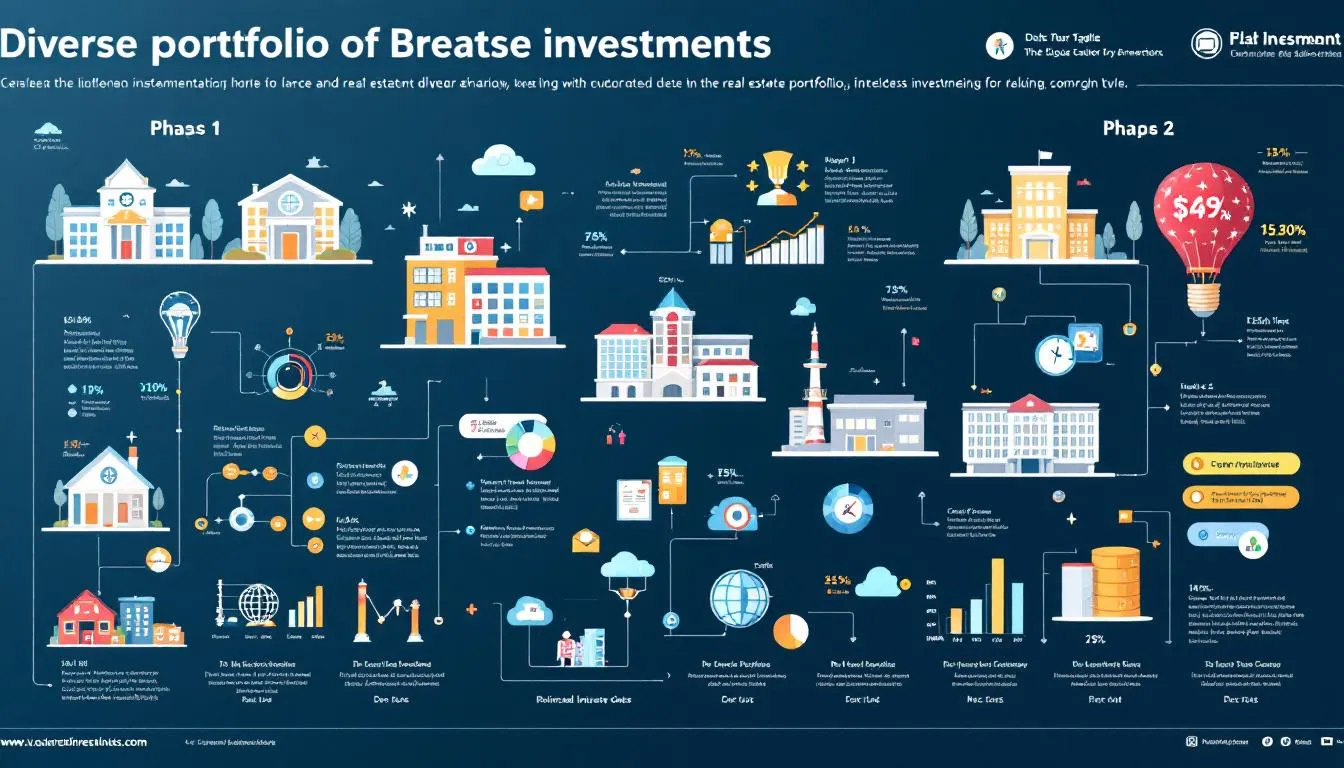
Mastering the Real Estate Investing Process: A Step-by-Step Guide
Diving into real estate investing? This step-by-step guide will simplify the real estate investing process, covering crucial steps like assessing your finances, choosing the right strategies, securing financing, and managing your investments effectively.
Key Takeaways
- Real estate investing involves various strategies, including rental properties and house flipping, requiring knowledge of market trends, finances, and property management.
- Assessing your financial situation and understanding your risk tolerance are critical steps before engaging in real estate investments.
- Successful real estate investing relies on ongoing research of market trends, identifying profitable markets, and leveraging tax advantages to enhance returns.
Understanding Real Estate Investing

Real estate investing involves purchasing properties to generate profit, either through rental income, property appreciation, or both. It’s considered one of the safest types of investments due to its potential for steady income and long-term property value appreciation. Many investors venture to invest in real estate to achieve financial freedom and create a diversified investment portfolio. Real estate investments are the world’s largest asset class, valued at more than $230 trillion, highlighting their significance in the global economy. Real estate investing is also a common way to earn extra income and build wealth gradually, even for those who are not already wealthy.
Different investment strategies can cater to varying goals—whether it’s renting out residential properties for monthly income or flipping houses for quick profits. Rental income remains a popular choice as it provides a steady stream of passive income while potentially benefiting from property appreciation over time. Rental properties and real estate crowdfunding are effective ways for investors to generate additional income alongside their primary earnings. Investors must equip themselves with the necessary skills and knowledge, including understanding profitability, cash flow, and financing, to ensure they can generate income successfully.
Moreover, successful real estate investors rely on their ability to communicate, negotiate, and problem-solve effectively. Developing these skills is essential for becoming a successful real estate investor. Researching the real estate market, including local conditions and economic indicators, is vital for making informed decisions. Gaining these insights will help you navigate the complexities of real estate investments and set the foundation for a thriving investment journey.
Real Estate Investment Goals
Setting clear real estate investment goals is the foundation of a successful investing journey. Real estate investors often pursue objectives such as generating passive income, building long-term wealth, and diversifying their investment portfolios. Whether your aim is to acquire multiple rental properties for steady rental income or to benefit from property appreciation and tax benefits, having well-defined goals will guide your decisions in the real estate market.
Successful real estate investors align their investment strategy with their personal finance situation and risk tolerance. For example, some may focus on residential properties for consistent cash flow, while others might target commercial real estate or real estate investment trusts (REITs) for broader diversification. When setting your goals, consider factors like expected cash flow, potential property appreciation, and the tax benefits associated with different types of real estate investments.
By understanding your own risk tolerance and financial objectives, you can choose the right investment strategy—whether it’s building a portfolio of rental properties, investing in commercial real estate, or leveraging REITs for passive income. Clear goals not only help you navigate the real estate market with confidence but also ensure you make informed decisions that support your long-term financial success.
Assessing Your Financial Situation
Before you dive into real estate investing, it’s imperative to evaluate your financial situation. Assessing your personal finance involves understanding your net worth, debt levels, and disposable income, all of which influence your risk tolerance and investment capacity. Establishing clear financial goals will help you determine the appropriate investment strategy and assess potential risks related to your own money.
Consider your available financial resources, including how much capital you can invest without jeopardizing your personal financial stability. Some real estate investments require significant upfront capital, while others might be less demanding. It’s essential to align your investment choices with your financial capacity to avoid over-leveraging and ensure sustainable growth. Failing to do so can increase the risk of losing money on your investments.
Understanding your risk tolerance is also crucial as some real estate investments are inherently riskier than others. For instance, investing in rental properties might offer:
- predictable cash flow Whereas house flipping can be:
- more volatile
- potentially more lucrative Thoroughly evaluating your financial situation and risk tolerance enables informed decision-making and sets a solid foundation for your real estate investment journey.
Types of Investment Properties
Investment properties come in a variety of forms, each offering unique opportunities and challenges for real estate investors. The most common types include:
- Residential properties: These include single-family homes, apartment buildings, and condominiums. Residential properties are popular for real estate investing because they can generate reliable rental income and often appreciate in value over time.
- Commercial properties: Office buildings, retail spaces, and warehouses fall into this category. Commercial real estate can provide steady income through long-term lease agreements and may offer higher returns, but often requires more capital and expertise.
- Real estate investment trusts (REITs): REITs allow individuals to invest in real estate without directly owning or managing properties. By purchasing shares in a REIT, investors can benefit from the income generated by a diversified portfolio of properties, including office buildings and apartment complexes.
- Other types: Land, industrial properties, and mixed-use developments also present investment opportunities. Each type of property has its own set of advantages and considerations, such as potential for appreciation, rental income, and management requirements.
When deciding to invest in real estate, it’s important to evaluate the characteristics of each property type and how they fit your investment strategy. Whether you’re seeking steady income from apartment buildings or a more hands-off approach through REITs, understanding the different types of investment properties will help you make informed choices and build a successful real estate investment portfolio.
Researching Investment Strategies

Real estate investing offers a plethora of strategies, each with its unique benefits and challenges. One popular method is purchasing rental properties, which can provide predictable cash flow and passive income. Residential real estate includes single- and multi-family homes and apartment buildings, offering diverse opportunities for investors. A real estate investor investing in real estate property requires financial resources and managerial skills to handle tenant relations and rent payments effectively, especially when managing their first rental property and adhering to the rental agreement.
House flipping is another exciting strategy where investors buy undervalued properties, renovate them, and sell them at a profit. This method can be highly profitable but requires a keen eye for market trends, construction costs, and property values.
For those looking for a more hands-off approach, an investment group and real estate investment trusts (REITs) offer excellent opportunities. REITs allow individuals to invest in commercial real estate without direct ownership, providing regular dividend payments from rent collection. Real estate investment trusts (REITs) are companies that own commercial real estate and generate income from rent collection, making them an attractive option for investors seeking steady returns.
Real estate crowdfunding and mutual funds are also viable options for diversifying your investment portfolio without needing substantial upfront capital. A mutual fund can provide a diversified real estate portfolio, often including REITs, and is comparable to ETFs as an investment option for both novice and experienced investors. Each strategy requires careful consideration of your financial situation, goals, and risk tolerance. Understanding the various investment strategies allows you to choose the one that aligns best with your objectives and start investing with confidence.
Identifying Profitable Markets
To succeed in real estate investing, identifying profitable markets is paramount. Understanding the dynamics of the local market is crucial as it directly influences property values and rental demand. Key economic indicators such as mortgage rates, employment statistics, and local government policies significantly affect the real estate market and should be closely monitored.
When evaluating potential investment locations, consider factors like population growth, median home sales price, and gross rental yield. High-demand areas, while competitive, often promise better returns due to strong buyer and renter interest. Additionally, future development plans in the neighborhood can substantially impact property values and rental demand.
Researching local amenities, including school districts, nightlife, and public transportation, can also provide insights into the area’s attractiveness to potential tenants. Understanding property taxes and crime rates in the neighborhood is essential as these factors can significantly impact your net operating income and overall investment profitability. Key takeaways include the potential benefits of these elements in making informed decisions about apartment buildings.
Thoroughly researching and identifying profitable markets enables informed decisions and maximizes returns.
Financing Your Investments

Securing financing is a critical step in real estate investing. Various financing methods are available, each with its requirements and implications. Conventional loans are common but often require larger down payments and higher interest rates for investment properties. Hard money loans, which focus on the property’s value rather than the borrower’s credit, are another option but come with higher interest rates and shorter terms. Finding financing for an investment property can be trickier than getting a mortgage for your primary residence, as lenders often impose stricter criteria to mitigate risks.
Investors and other investors can explore the following financing options:
- Commercial loans, which have stringent criteria but may offer favorable terms for large-scale investments.
- Creative financing options like real estate crowdfunding, allowing multiple investors to pool resources and start investing without substantial upfront capital.
- Loans where up to 75% of expected rental income can be counted as qualifying income, provided proper documentation is in place. Rental income from renting out a room or unit can help make a mortgage payment more manageable by offsetting housing costs.
Carefully considering your financial situation and investment strategy is crucial when choosing a financing method. Each option has its advantages and drawbacks, and selecting the right one can significantly impact your investment’s success and profitability.
Finding the Right Property

Finding the perfect investment property requires thorough research and due diligence. Important considerations include:
- Understanding different types of real estate and zoning regulations before making a purchase.
- Evaluating the condition and location of a property, as they play a significant role in its profitability and potential for appreciation. Renting out a room or part of your property can help reduce housing costs by generating rental income, which can offset your mortgage or contribute to your investment goals.
- Utilizing analytical software and reporting services to assess a property’s profitability and volatility, ensuring informed decisions.
Working with a real estate agent can simplify the process of finding and purchasing properties. Real estate agents have the expertise and networks to guide you through property transactions and identify lucrative opportunities. However, it’s important to remember that agents typically work on commission, so their services come at a cost.
Leveraging professional assistance and modern tools helps you find the right commercial property that aligns with your investment goals and strategies. Whether you’re looking for rental properties, commercial real estate, or house flipping opportunities, thorough research is key to making a successful investment.
Managing Your Properties
Efficient property management is vital for maintaining and maximizing the value of your investment properties. Property managers handle various tasks, including tenant screening, lease management, and property upkeep, ensuring your investment runs smoothly. Landlords must have knowledge of rental laws and tenant rights to manage their properties effectively and avoid potential legal disputes. Whether you choose to self-manage or hire a professional property manager depends on your willingness to handle daily operations and the cost-effectiveness of outsourcing these tasks.
Managing properties yourself can save money but requires significant time and effort. On the other hand, hiring a property manager can free you from daily operational challenges, allowing you to focus on expanding your investment portfolio.
Weighing the pros and cons of each approach will help you find the best property management solution for your needs.
Investment Property Maintenance
Maintaining your investment properties is essential for protecting property value and ensuring a consistent cash flow. Regular inspections and prompt attention to repairs help prevent minor issues from becoming costly problems. Routine maintenance tasks—such as landscaping, cleaning, and system checks—keep properties attractive to tenants and support higher occupancy rates.
Many real estate investors choose to hire property management companies or professional contractors to handle maintenance and repairs, especially if they own multiple investment properties or live far from their real estate assets. Effective property management not only preserves the property’s condition but also helps navigate local market trends, property taxes, and regulatory requirements that can impact your investment.
Staying proactive with maintenance ensures your investment properties remain competitive in the local market, retain their value, and continue to generate reliable rental income. By prioritizing upkeep and staying informed about changes in property taxes and regulations, you can minimize risks and maximize returns on your real estate investment.
Calculating Returns and Managing Risks
Calculating returns and managing risks are critical components of successful real estate investing. Return on investment (ROI) can be determined using the cost method, which considers total investment costs, or the out-of-pocket method, which evaluates ROI based on the actual cash invested. Both methods help investors understand their earnings and make informed decisions.
To calculate your earnings, add your gross profits and subtract total costs, including initial investment, repair costs, advertising costs, real estate fees, and inspection fees. Real estate investments are considered physical assets, and their tangible nature should be factored into overall profits and costs. Factors such as local economic conditions, property supply and demand, and specific location impact ROI and should be carefully considered.
Managing risks involves:
- Understanding your risk tolerance
- Employing strategies to mitigate potential losses
- Investing in different property types and locations to diversify your investment portfolio and reduce the risks involved
- Leveraging technology, such as AI and PropTech tools, to enhance decision-making and risk management in real estate investments.
Leveraging Tax Advantages
Real estate investing offers several tax advantages that can enhance overall profitability. Investors can deduct expenses related to property management, including property taxes, mortgage interest, and maintenance costs. Depreciation allows you to deduct the property’s loss in value over time, with residential properties having a depreciation life of 27.5 years. It is crucial to understand tax rules related to rental income and property management to ensure you meet all tax obligations and maximize available tax breaks.
Investing in opportunity zones can provide significant tax incentives, such as deferring capital gains tax until 2026. Additionally, income generated from rental properties is not subject to FICA taxes, which typically apply to earned income. Understanding and leveraging these tax benefits can significantly reduce your tax bill and increase your net income from real estate investments.
Building a Diversified Portfolio

Building a diversified portfolio is essential for managing risk and achieving long-term success in real estate investing. Diversification involves including different types of real estate investments, such as:
- Residential properties
- Commercial properties
- Mixed-use properties This approach helps avoid relying on a single property type or location, thereby stabilizing returns and reducing risk exposure.
Investing in sustainable properties and emerging sectors like digital infrastructure real estate can also yield positive returns. Additionally, spreading investments across different regions, such as various countries or cities, can balance your portfolio and lessen exposure to local economic changes.
Diversifying your investment portfolio allows you to build wealth while managing risks effectively. This strategy ensures that you are not overly dependent on any single market or property type, providing a stable foundation for your real estate investing journey.
Monitoring Market Trends
Monitoring market trends is crucial for making informed investment decisions. Interest rate trends, demographic changes, and overall economic conditions significantly impact the real estate market and market volatility. Keeping track of these trends helps investors anticipate changes in property values and adjust their investment strategies accordingly.
Government policies, tax incentives, and local market conditions also play a vital role in shaping real estate trends in the real estate industry. Subscribing to newsletters from real estate firms, networking with agents and investors, and participating in local real estate events can provide valuable insights into market changes and opportunities.
Utilizing real estate analytics tools and maintaining a personal database of property listings can further enhance your ability to track market trends and make data-driven investment decisions. When considering publicly traded REITs, it's important to note that they are bought and sold on the stock market, offering greater liquidity and accessibility compared to traditional real estate investments, but they may also carry different risk profiles. Staying informed about market trends is essential for optimizing your investment strategy and achieving success in real estate investing.
Common Mistakes to Avoid
Navigating the real estate market can be challenging, especially for new investors. Some common mistakes include:
- Inadequate research: Failing to thoroughly research the local market, property values, and rental demand can lead to poor investment choices.
- Insufficient funding: Underestimating the costs involved or overextending financially can jeopardize your investment and cash flow.
- Poor property management: Neglecting property management responsibilities can result in tenant issues, property damage, and lost rental income.
- Overestimating rental income: Being overly optimistic about potential rent payments can lead to financial shortfalls if the market doesn’t support your expectations.
- Underestimating expenses: Overlooking costs such as maintenance, property taxes, and vacancies can erode profits.
- Lack of diversification: Relying on a single property or market increases risk, especially during economic downturns.
To avoid these pitfalls, work with a reputable real estate agent, consult with attorneys and other professionals, and always base your decisions on solid research and realistic projections. By being aware of these common mistakes, you can better manage your investment properties, protect your cash flow, and achieve greater success in the real estate market.
Additional Resources for Investors
Real estate investors have access to a wealth of resources to help them succeed in the real estate investing world. Online platforms, such as real estate crowdfunding sites and investment property marketplaces, make it easier to connect with other investors, discover new investment properties, and explore financing options. Educational resources—including books, podcasts, and webinars—offer valuable insights on topics like property management, tax benefits, and investment strategies.
Joining local real estate investing groups, attending industry conferences, and participating in online forums can provide networking opportunities and firsthand advice from experienced investors. Many financial institutions and investment companies also offer specialized tools and products for real estate investors, such as mutual funds, real estate investment trusts (REITs), and other real estate funds.
By leveraging these resources, you can stay informed about market trends, learn from the experiences of other investors, and make smarter decisions about your investment properties. Continuous learning and networking are key to minimizing risks, maximizing returns, and achieving your real estate investment goals.
Summary
Real estate investing offers a path to financial freedom, steady income, and portfolio diversification. By understanding the investment process, evaluating your financial situation, researching strategies, identifying profitable markets, and leveraging tax advantages, you can make informed decisions and achieve success. Embrace the journey, stay informed, and let your real estate investments pave the way to financial independence.
Frequently Asked Questions
What are the initial steps to start investing in real estate?
To start investing in real estate, first comprehend the fundamentals of real estate investing and assess your financial situation. This foundation will guide you in exploring investment strategies that align with your goals and risk tolerance.
How do I choose the right market for real estate investment?
To choose the right market for real estate investment, prioritize understanding local market dynamics and economic indicators, such as population growth and rental yield. High-demand areas typically yield better returns on investment.
What financing options are available for real estate investments?
A variety of financing options are available for real estate investments, including conventional loans, hard money loans, commercial loans, and real estate crowdfunding. Each option has distinct requirements and implications, so it's essential to choose the one that aligns best with your investment strategy.
How can I manage my investment properties effectively?
To manage your investment properties effectively, decide between self-management or hiring a professional property manager based on cost, time, and your personal capacity. This choice will significantly impact your investment's success.
What tax advantages are available for real estate investors?
Real estate investors can take advantage of deductions for property management expenses, depreciation, and tax incentives in opportunity zones, while also enjoying the benefit that rental income is not subject to FICA taxes. These advantages can significantly enhance overall investment returns.

